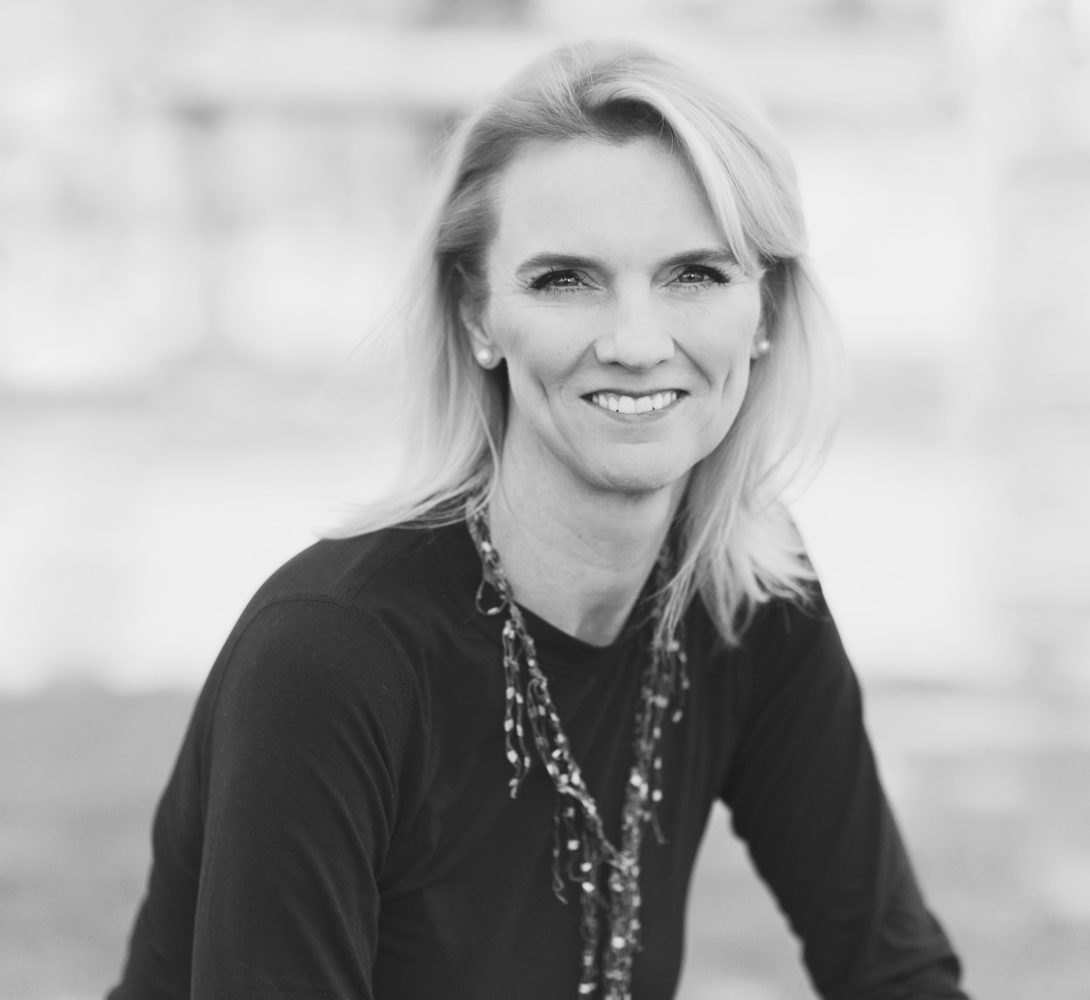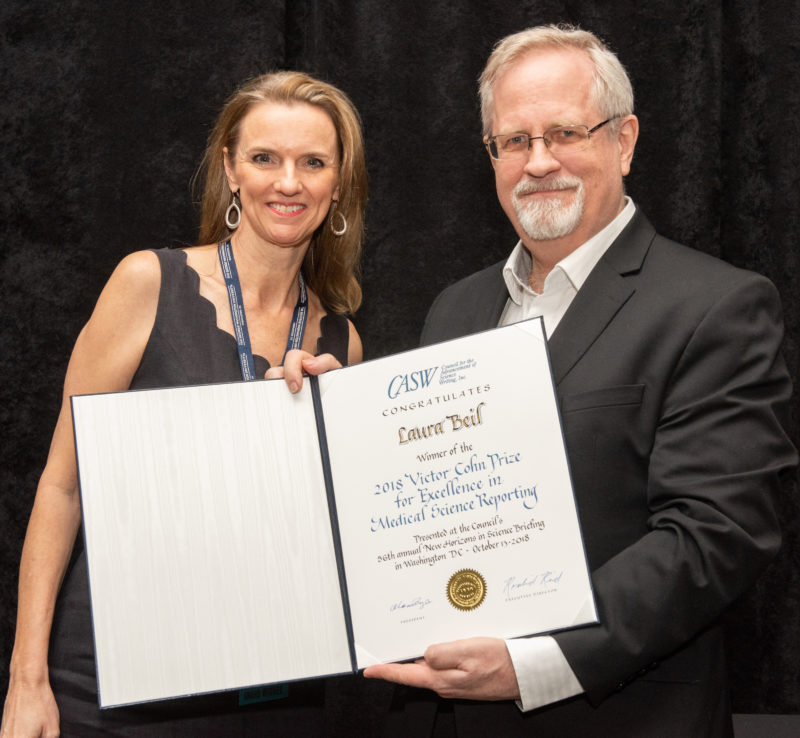
Freelance journalist Laura Beil awarded 2018 Victor Cohn Prize for Medical Science Reporting
Freelance medical writer Laura Beil, a career journalist whose work combines gripping narrative and dogged reporting to illuminate issues of personal concern to a wide range of readers, is the recipient of the 2018 Victor Cohn Prize for Excellence in Medical Science Reporting. The prize is awarded annually by the Council for the Advancement of Science Writing (CASW).
Judges cited Beil for the often-breathtaking, “grab-you-by-the-throat” quality of her writing, the “extraordinary diversity of both the subject matter she strives to illuminate and the audiences she reaches,” and the “remarkable utility of her reporting.” Her stories, they noted, stood out among a number of strong nominations for the deep and detailed richness of their reporting, and the enterprise and personal commitment evident in each one.
Beil, who lives in Cedar Hill, Texas, is only the second freelance writer to be awarded the Cohn Prize since its inception in 2000. She is the 21st recipient of the prize, given for a body of work published or broadcast within the past five years.
Letters from colleagues in support of her nomination noted Beil’s ability to discover and relentlessly pursue important untold stories, and to convince editors of diverse publications to publish them. “Her forte is finding issues that everyday people care about, angles that others may miss, and questioning authority and dogma,” wrote AP medical writer and Cohn Prize laureate Marilynn Marchione. Marchione also pointed out Beil’s emphasis on personal stories. “While some writers use patients as anecdotes, almost like window dressing or a mandatory ingredient,” she wrote, “Laura makes them the stars of her stories. She explains medicine through the people experiencing it. Her style of personal storytelling is so powerful that it propels people to read to the end, science and all.”
Tom Siegfried, who as science editor of The Dallas Morning News and later as editor in chief of Science News worked with Beil, wrote that Beil “finds stories that no one else finds, and routinely spots trends and upcoming issues before other writers.” He added that her work has provided great benefit to her readers. In one case documented on a television broadcast, Siegfried recalled, a mother of a dying child read Beil’s story about a deadly form of E. coli and “recognized that doctors had missed the diagnosis, leading to proper treatment and the child’s survival.”
In selecting Beil, the judges drew particular attention to a story she wrote for Men’s Health on mental health issues in the military. To tell the powerful and tragic story of Eddie Routh, a troubled veteran who killed Navy SEAL Chris Kyle and another man after failing to get vital help from an overwhelmed Veterans Administration, she wrote repeatedly to Routh’s family and overcame a judge’s gag order on the family. Published in late 2013 while the case was fresh, “Who Killed Chris Kyle?” was later expanded into an e-book.

Other stories published in Science News, Reader’s Digest and Texas Monthly tackled questions about widely used surgery and drugs, vaccination hesitancy, and obesity among high school football players. The judges noted that Beil has also published medical reporting in The New York Times and Cosmopolitan. About the latter, Beil said, “few things make me happier than knowing that someone has been introduced to the complexities of medical science while getting their hair done.”
These recent examples cap a long reporting career that began at the Dallas paper. It was during her 15 years as a medical writer there, Beil told the judges, that she had “first read the copy of [Victor Cohn’s book] News & Numbers I keep to this day.”
Beil received a $3,000 award and certificate and was honored in Washington, D.C., on October 13, as science writers gathered for ScienceWriters2018, a conference jointly organized by CASW and the National Association of Science Writers (NASW). CASW, a not-for-profit organization of journalists and scientists committed to improving the quality of science news and information reaching the public, produces the annual New Horizons in Science program at each annual conference.
Laura Beil
Laura Beil (@ljbeil) began her career at The Dallas Morning News, where she was the medical reporter from 1992 to 2006. Since leaving the world of daily journalism, she has written mostly for magazines. While specializing in health and science, she has also written about gun-toting liberals for D Magazine and was the writer-reporter of the “Thugs” episode for the NPR series This American Life. She has been a contributor to Men’s Health and is a correspondent for Science News. Most recently, she released a six-part podcast about a neurosurgeon in Dallas who left most of his patients in pain, paralyzed or dead. (At the time of this announcement, “Dr. Death” was #1 on the podcast charts and had received almost 7,000 five-star reviews.) The Victor Cohn Prize is the latest of several recent recognitions. Beil was the recipient of the 2012 June Roth Award for Medical Journalism and won the American Society of Journalist and Authors (ASJA) award for Reporting on a Significant Topic in both 2013 and 2014. In 2015 her story “What’s Wrong with Robotic Surgery?” for Men’s Health was chosen Best Consumer Feature by the Association of Health Care Journalists (AHCJ). She was a National Magazine Award finalist in 2016. She is a member of NASW, AHCJ and ASJA.
The Victor Cohn Prize
This year’s Cohn Prize entries were judged by Christie Aschwanden, lead writer for science at FiveThirtyEight and a member of the CASW Board; Ben Patrusky, CASW’s executive director emeritus; Joann Rodgers, former national science correspondent and columnist for the Heart Newspapers, longtime executive director of media relations and public affairs for Johns Hopkins Medicine, and former CASW president; and Cristine Russell, freelance journalist, senior fellow and lecturer at the Harvard Kennedy School and immediate past president of CASW.
The inaugural Victor Cohn Prize for Excellence in Medical Science Reporting in 2000 was shared by Laurie Garrett of Newsday and Lawrence K. Altman of The New York Times. Subsequent recipients were Jon Palfreman, a public television documentarian; Daniel Q. Haney, medical editor, The Associated Press; Shannon Brownlee, a noted magazine writer and book author; Michelle Trudeau of National Public Radio; Rick Weiss of the Washington Post; Jerome Groopman of The New Yorker; Geeta Anand of The Wall Street Journal; Joe Palca of NPR; Denise Grady of The New York Times; Marilynn Marchione of the Associated Press; Ron Winslow of The Wall Street Journal; Jon Cohen of Science magazine; John Fauber of the Milwaukee Journal Sentinel; freelance health reporter and former NPR correspondent Joanne Silberner; Elisabeth Rosenthal of The New York Times; Mark Johnson of the Milwaukee Journal Sentinel; Liz Szabo, health writer for USA Today and senior correspondent for Kaiser Health News; and Sharon Begley, senior science writer at STAT.
The award honors the late Washington Post medical writer and health columnist Victor Cohn, known as the dean of medical science reporting. He distinguished himself by the clarity and effectiveness of his reporting during a 50-year career that began with outstanding coverage of early “wonder” drugs and the polio vaccine, as well as the dawn of the modern space age. Late in his career, Cohn started a Post column called “The Patient’s Advocate,” and authored News & Numbers: A Guide to Reporting Statistical Claims and Controversies in Health and Other Fields. Cohn, who died of cancer in 2000, was a co-founder in 1959 of CASW.
To read Laura Beil’s work, visit her website.
To learn more about CASW (Twitter: @sciencewriting), the Cohn Prize and past recipients, visit this page.
To learn more about ScienceWriters2018 (Twitter: #sciwri18), visit https://sciencewritersmeeting.org/2018/.